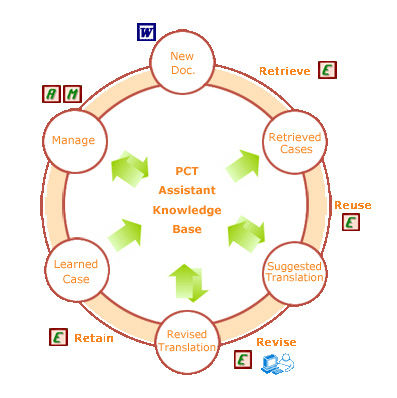
Characteristics
PCT Assistente 2.0 is a machine aided Portuguese to Chinese translation system that provides a translation workbench for the professional translators to carry out his/her translation work. It is released in December 2004.
The whole translation process is carried out in the Microsoft Word environment and all the related systems are embedded inside the MS Word application and are hidden from user.
Morphological analysis module is applied in the system to tackle the Portuguese characteristic of rich morphology inflection.
PCT Assistente Knowledge is installed with a basic linguistic knowledge with more than 100,000 entries.
User can create multiple databases for use in different translation subject fields. With these tools, different types of translation knowledge can be effectively managed and applied.
Life Cycle

Knowledge retrieval:
To a new input sentence, the system will look for a set of similar example cases or fragments from the knowledge base, and return to user for references.
Knowledge adaptation:
In this phase, the recalled list of examples is used to facilitate the translation for the input by referencing the translations of the analog examples.
User revision:
The suggested translation is presented to user for further revision if any amendment is necessary. This allows the user to interfere the translation process.
Knowledge learning:
For any new translations, if it is valuable, it can be retained and stored in the knowledge base for future use. This functional behavior allows the system to accumulate more translation knowledge during the working cycle of a translator. Gradually, as the system gains more knowledge, the system can achieve more promising translation result.
